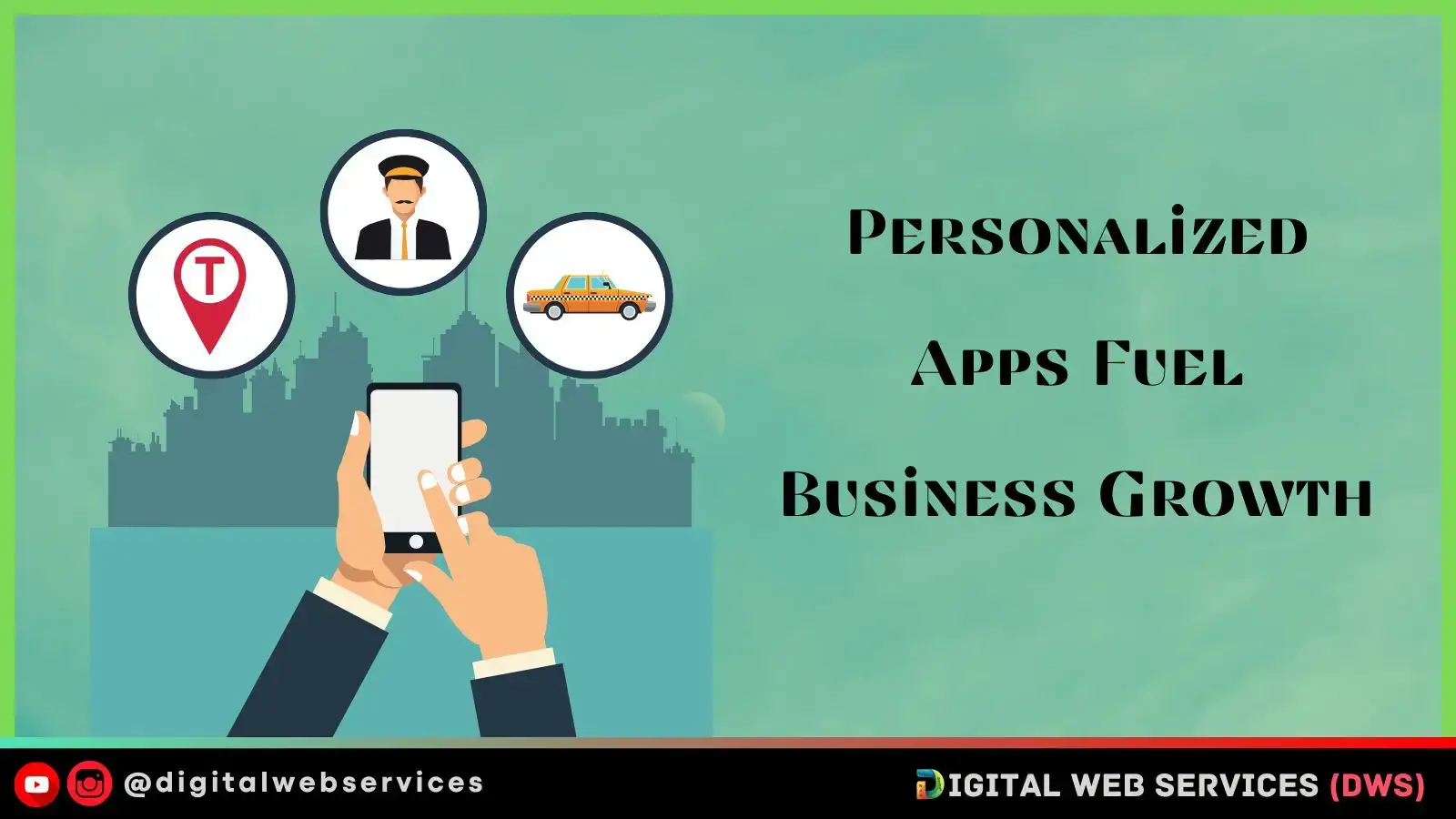
Personalized applications have risen to prominence as a game-changing tool for businesses seeking to boost user engagement, improve customer retention, and ultimately, fuel their growth. Delivering tailored experiences through personalized apps has become an indispensable strategy for businesses across diverse sectors.
According to the VP of Software Engineering at Space-O Technologies, “Personalised apps seek to give each user a custom experience matched as per their requirements. More than displaying personalized information, good personalized apps try to understand their users. Personalized apps also help to connect your brand emotionally with the user.”
Go through this blog post to understand eight key ways that personalized apps can significantly impact and drive business growth. Also, we have provided valuable insights for tech leaders and decision-makers to stay ahead in the dynamic market of mobile apps.
1. Enhanced User Experience (UX)
Personalized apps revolutionize the user experience by tailoring content, recommendations, and functionalities to individual preferences and behaviours, resulting in a highly satisfying and engaging digital interaction. Learn below how it helps to enhance the UX.
Customized Content:
- Personalized apps leverage advanced algorithms and data analysis to study user behaviour, including their past interactions, search history, and preferences.
- These insights enable the app to curate and present content that is highly relevant to each user’s interests and needs.
- For example, a personalized news app can prioritize news articles based on a user’s reading habits, ensuring they see stories that align with their interests.
Intuitive Interface:
- To ensure a seamless user experience, personalized apps adapt their interfaces based on how users interact with the platform.
- For instance, frequently used features or buttons can be prominently displayed for easy access, while less-used elements can be minimized or placed in less prominent positions.
- This customization reduces friction in navigating the app, making it more intuitive and user-friendly.
- An e-commerce app might rearrange its homepage to prominently display products and categories a user frequently views or buys.
2. Improved Customer Retention
To sustain or grow your business, you need a good rate of customer retention. Personalized apps play a pivotal role in nurturing and fortifying the relationship between businesses and their customers, thereby significantly enhancing customer retention rates.
Personalized Engagement Strategies:
- Personalized apps employ targeted engagement strategies that cater to individual user preferences and behaviours, fostering a deeper connection between users and the app.
- Targeted Notifications: By leveraging user data and behavioural patterns, personalized apps send notifications that are highly relevant and timely. These notifications could include reminders, updates, or special offers, prompting users to re-engage with the app.
- Recommendations Based on User History: Utilising sophisticated algorithms, the app suggests products, services, or content based on past interactions. These tailored recommendations improve the chances of users finding items of interest, increasing the likelihood of continued engagement.
Building Lasting Loyalty:
- The ability of personalized apps to address and cater to specific user preferences creates a sense of loyalty and commitment, encouraging users to remain engaged with the app over time.
- Tailored User Experience: The app’s ability to adapt its interface, content, or functionalities based on user preferences ensures a personalized and satisfying experience. This tailored approach resonates with users, making them feel valued and understood.
- Consistent and Relevant Content Delivery: Providing users with content that aligns with their interests and needs establishes a consistent and valuable experience. Whether it’s articles, product suggestions, or personalized tips, delivering relevant content keeps users engaged and loyal.
Do you want to learn how to make your mobile apps more safe and engaging? Check this blog post that describes the core mistakes to avoid when developing a mobile app.
3. Data-Driven Decision Making
Personalized apps serve as a treasure trove of user data, empowering businesses with actionable insights to drive informed decision-making and formulate effective strategies.
Harnessing Behavioral Analytics:
- Personalized apps gather and analyze user interactions, generating valuable data that sheds light on user behaviour and preferences.
- Tracking User Journey: By monitoring user journeys within the app, businesses gain insights into how users navigate, engage, and interact. This data helps identify popular features, pain points, and areas for improvement.
- Understanding User Preferences: Behavioural analytics delve into individual user preferences, such as preferred content types, products, or services. This understanding aids in tailoring offerings to match specific user desires, enhancing satisfaction and engagement.
Predictive Analysis:
- Utilizing the wealth of data collected from personalized apps, businesses leverage predictive analysis techniques to foresee trends and anticipate user behaviours.
- Pattern Recognition: Identifying patterns in user behaviour enables businesses to anticipate future actions or needs. For instance, recognizing a specific browsing pattern may indicate an imminent purchase intent.
- Forecasting User Trends: Analysing historical data helps in predicting future trends, allowing businesses to prepare and adapt their strategies proactively. Anticipating shifts in user preferences or market trends allows for timely adjustments to offerings. Learn more about the strategies and trends to consider when developing mobile apps.
4. Increased Conversion Rates
Enhancing conversion rates lies at the core of business success, and personalized apps play a pivotal role in optimizing user experiences to drive higher conversion rates.
Targeted Marketing Strategies:
- Personalized apps enable businesses to execute targeted marketing strategies, ensuring that promotional efforts resonate with individual user preferences and behaviours.
- Granular User Segmentation: By categorizing users based on their behaviours, interests, and demographics, personalized apps facilitate precise targeting. This allows for tailored marketing messages that resonate with specific user segments.
- Personalized Content Delivery: Leveraging user data, the app delivers content, advertisements, or promotions that align with users’ interests and past interactions. This personalized approach significantly increases the chances of conversion by presenting users with relevant and compelling offers.
Streamlined Checkout Process:
- Personalized apps optimize the purchasing journey by customizing user interfaces and experiences, minimizing friction points, and streamlining the checkout process.
- Tailored User Interface (UI): The app customizes its UI elements to suit individual user preferences, making the navigation and purchasing process intuitive and user-friendly. Personalized UI elements could include recommended products, simplified menus, or personalized call-to-action buttons.
5. Strengthened Brand Loyalty
Personalized experiences crafted through apps play a pivotal role in forging a robust and enduring sense of brand loyalty, solidifying the bond between users and the brand itself.
Emotional Engagement:
- Customized interactions within personalized apps evoke emotional responses, fostering profound connections that extend beyond mere transactional relationships.
- Personalized Content and Messaging: Tailored content and messages resonate with individual users on a deeper level, triggering emotional connections. Whether through personalized recommendations or heartfelt messages, these interactions create a sense of understanding and care.
- Humanizing the Brand: Personalised apps humanize the brand by offering experiences that feel personal and relevant. When users feel understood and valued, they are more likely to develop an emotional attachment to the brand, leading to increased loyalty.
Brand Advocacy:
- Satisfied and loyal customers cultivated through personalized experiences are inclined to become brand advocates, amplifying the brand’s presence and credibility through word-of-mouth and active support.
- Word-of-mouth Recommendations: Loyal customers tend to share positive experiences with others, whether through social media, reviews, or personal recommendations. This organic promotion helps expand the brand’s reach and influence.
6. Competitive Edge
Amidst fierce competition, personalized apps serve as a crucial differentiator, offering unique and adaptable experiences that set businesses apart and position them as innovative and responsive.
Differentiation: Crafting Unique User Experiences
- Customized experiences provided by personalized apps play a pivotal role in setting businesses apart from their competitors and attracting and retaining users in a crowded marketplace.
- Tailored Offerings: Personalized apps curate offerings, whether products, services, or content, to match individual user preferences. This customization creates a sense of exclusivity and relevance that resonates with users, distinguishing the brand from competitors offering generic experiences.
- Personal Touchpoints: Incorporating personalized interactions at various touch points throughout the user journey fosters a sense of connection and uniqueness. This personalized touch elevates the overall user experience, making it more memorable and distinctive.
Adaptability: Remaining Innovative and Responsive
- The ability of personalized apps to adapt and evolve based on user feedback positions businesses as innovative, responsive, and in tune with evolving user needs and preferences.
- Continuous Iteration: Personalized apps leverage user data and feedback to drive continuous improvements and updates. This iterative approach ensures that the app evolves alongside changing user expectations and technological advancements.
- Agile Responsiveness: Being responsive to user feedback and market trends allows businesses to swiftly adapt their strategies and offerings. This agility enables them to seize opportunities and address challenges promptly, staying ahead in the competitive landscape.
7. Scalability and Flexibility
Personalized apps are designed with scalability and flexibility in mind, allowing them to grow and evolve alongside users’ needs and technological advancements.
Scalable Infrastructure:
- The architecture of personalized apps is built on flexible frameworks that facilitate seamless scalability to accommodate increasing user bases and evolving demands.
- Elasticity in Resources: Personalized apps utilize scalable cloud-based infrastructure, enabling resources to scale up or down dynamically based on user demand. This ensures that the app can handle fluctuations in user traffic without compromising performance.
- Load Balancing: Scalable infrastructure incorporates load-balancing mechanisms that distribute incoming traffic efficiently across servers. This ensures optimal performance, preventing overloading during peak usage periods.
Adaptive Features:
- Regular updates and enhancements in personalized apps cater to evolving user preferences, ensuring continuous relevance and usability.
- Iterative Development Cycle: Personalized apps follow an iterative development cycle that includes frequent updates and feature enhancements. This agile approach allows for quick adaptations to incorporate new functionalities or improve existing ones based on user feedback.
- User-Centric Updates: Feature enhancements are driven by user insights, ensuring that updates align with user needs and preferences. This user-centric approach contributes to higher user satisfaction and engagement.
8. Monetization Opportunities
Personalized apps present businesses with diverse avenues to monetize their offerings, leveraging tailored experiences to generate revenue through subscription models and in-app purchases.
Subscription Models:
- Personalized apps create opportunities for businesses to offer subscription-based models, providing tailored premium offerings aligned with user preferences.
- Customized Subscription Tiers: Personalized apps can offer different subscription tiers based on varying user needs and preferences. This tiered approach allows users to choose plans that align with their requirements, leading to higher subscription uptake.
- Exclusive Content or Features: Subscriptions often grant access to exclusive content, features, or services not available to non-subscribers. Tailoring these offerings to match user interests incentivizes users to subscribe and access premium content.
In-App Purchases:
- Personalized apps employ customized recommendations and offer to drive in-app purchases, unlocking additional revenue opportunities.
- Personalized Product Suggestions: Analysing user behaviours and preferences allows personalized apps to recommend relevant products or services within the app. These tailored suggestions increase the likelihood of users making purchases.
Conclusion
In conclusion, personalized apps catalyze business growth, revolutionizing user experiences, fostering loyalty, and enabling data-driven strategies. Embracing personalized app development and leveraging user-centric approaches can propel businesses toward sustainable growth in an increasingly competitive digital
Digital Web Services (DWS) is a leading IT company specializing in Software Development, Web Application Development, Website Designing, and Digital Marketing. Here are providing all kinds of services and solutions for the digital transformation of any business and website.










